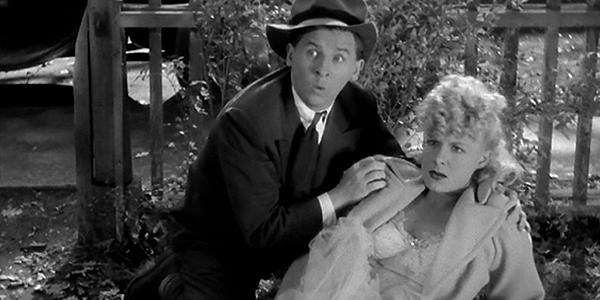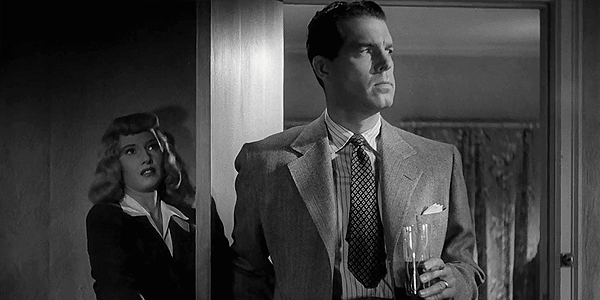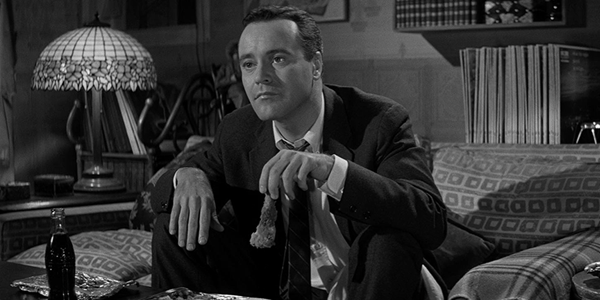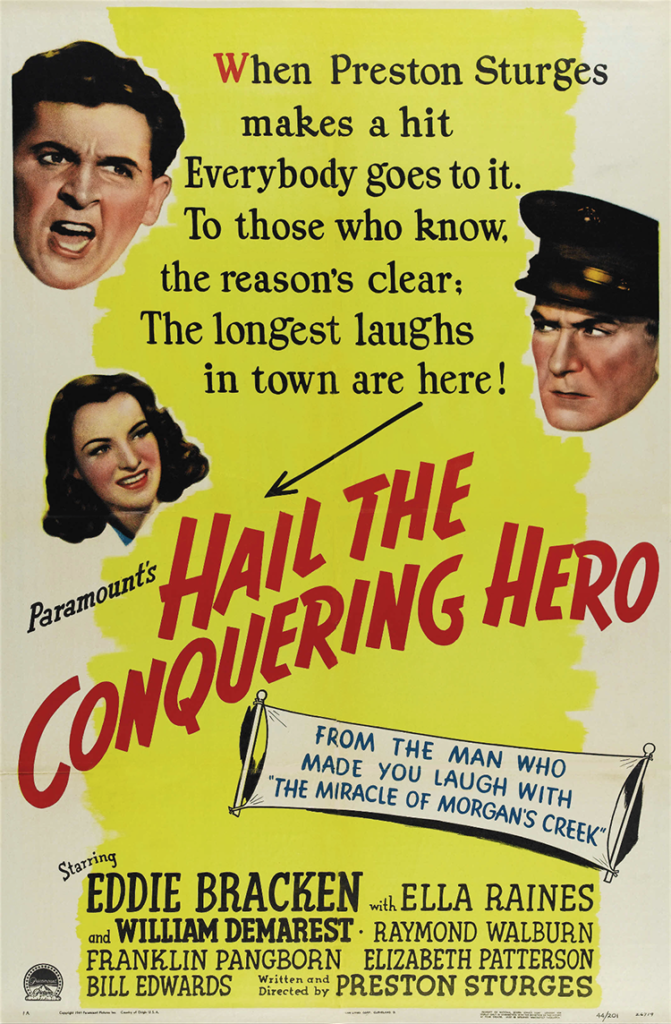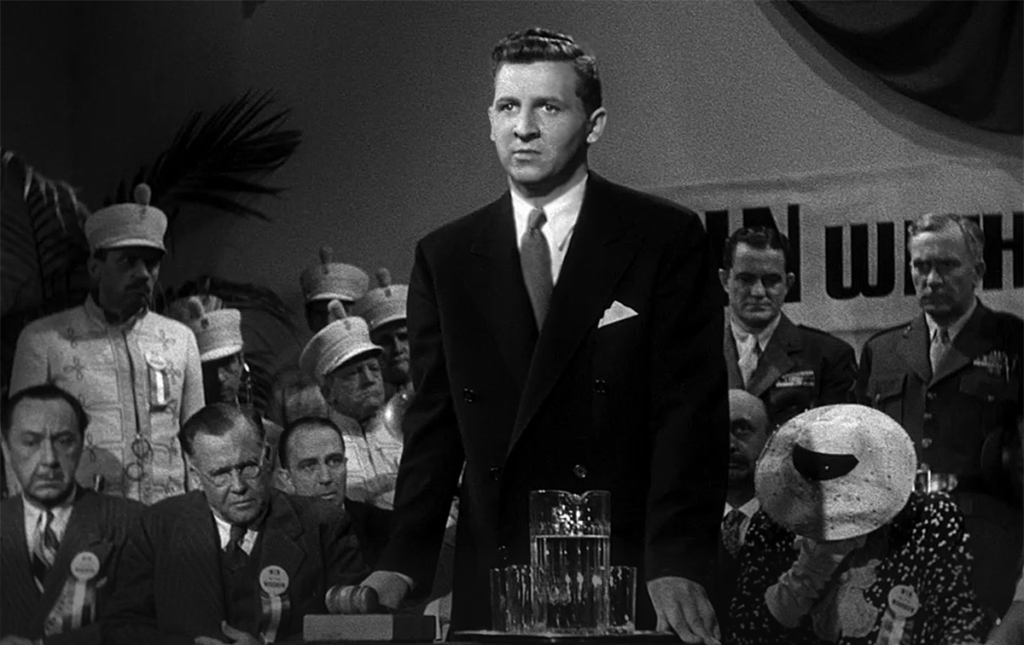
review | Hail the Conquering Hero
This Preston Sturges comedy would be one of the very best American films if Sturges hadn’t decided to pull his punches at the end
by Michael Gaughn
November 7, 2022
We’re back in smalltown America again with Eddie Bracken and William Demarest and the action again revolves around World War II, but beyond that Hail the Conquering Hero bears little resemblance to The Miracle of Morgan’s Creek from just earlier that same year. Preston Sturges was on a roll and Morgan’s Creek had been one of the biggest films of 1944, but he was never one for formula and Conquering Hero is dark and almost brooding in exactly all the places where Morgan’s Creek was silly and light.
Sturges pretty much broke the comedy mold here. The first almost 20 minutes are shot and for the most part performed as straight drama—so are most of the closing 15. The satire, which was so light in Morgan’s Creek that the audience wasn’t even sure it was being kidded, is here brought to the foreground and with such force that it verges on the vicious and bitter. The contrasts are so stark that, if it wasn’t for the presence in both films of Bracken and Demarest, of Sturges’ recurring themes and his vast stock company, it would be hard to believe they’re from the same director, let alone made in the same year.
This was all very much deliberate of course and not just Sturges being wildly schizo. You just need to compare Bracken’s characters, and his performances, to see what Sturges is up to. In Morgan’s Creek, Bracken is so broad you almost want to cringe. Here, his character is again a schnook but he’s also a genuinely tortured soul. The Norval of Morgan’s Creek could have never done the long monologue about the history of the Marines or the closing speech where Bracken tells the town members he’s nothing but a fraud while at the same time basically calling them a bunch of morons.
Morgan’s Creek was about how war hysteria had stirred the moral pot, breaking up the too-simple strictures of smalltown America and putting them in play. In Conquering Hero, Sturges frontally attacks the American love for appearances over substance, how we’ll believe practically anything as long as it comes from someone we want to believe in and are deaf to the people we don’t want to see. The film revolves around the premise that we already know what we want to hear and are just looking for mouthpieces that fit those preconceptions—which is why Bracken is able to get away with so visibly and audibly reacting to being forced into that role. The townspeople literally can’t see or hear him.
The scene where he tries to resist the locals’ effort to draft him into running for mayor, with them conveniently spinning his protests into affirmations, is a sitcom staple I don’t think has ever once worked on TV. But it succeeds here because Sturges has built up to it so carefully and cunningly that it becomes an ambiguous and troubling moment that almost gets the audience to look at itself.
Hail the Conquering Hero is one of the great American movies and would be one of the very best if Sturges hadn’t gotten himself all snarled in his own net. The final third begins to fall into the tradition of bold and cutting truth-telling that defines the greatest American art—the saying “No! in thunder” that Melville ascribed to Hawthorne. But right after Sturges delivers a couple of staggering blows, he fails to finish the job, instead pulling his punches, all too aware he’s making a major-studio film in the middle of a particularly brutal war and ultimately reverting to what the audience wants to hear instead of what it ought to hear. And so it almost always goes with the movies, which is why they’ll always be a second-tier artform.
You have to wonder if Sturges’ inability to reconcile his insights and ambitions with the material didn’t spill over into the production, which is, at moments, oddly uneven. About half the cast proves nimble while the other half can barely get its lines out, which can be disconcerting when four or more of them are trading quips within the same scene. Ella Raines is undeniably striking but also as wooden as they come, and you just need to compare that four-minute take in Morgan’s Creek where Bracken and Betty Hutton stroll through town to the similarly long stroll here with Raines and the tall, handsome, and dull Bill Edwards to feel how the latter scene creates a drag on Conquering Hero. If coat trees could converse with each other, this is what it would sound like.
The cinematographer, as with Morgan’s Creek, is John Seitz, the man who in Double Indemnity single-handedly defined the look of noir and thereby the look of all American movies from that moment on. Conquering Hero has a much more noirish style than Morgan’s Creek and that couldn’t feel more right—partly because what Sturges is doing here overlaps sympathetically with the true heart of noir. The distance between Fred McMurray in Indemnity and Bracken in Hero is so slight they could be doppelgängers. Both are trying to control worlds that have their own agendas—worlds that definitely don’t have either character’s best interests at heart. Both ultimately have to admit to the futility of will and don’t so much come to accept their fates as have them imposed on them.
Visually, Conquering Hero is discernibly darker than Morgan’s Creek and that comes across well in the HD presentation on Amazon Prime, which is a step up from the same service’s presentation of the latter. But the deep grays (there are no real blacks) are muddy and crushed throughout, making the transfer darker than it should be, which can make the film feel a little oppressive. The 4K HDR release of A Clockwork Orange showed how using a transfer to bring a film all the way back to its original look can have a big impact on how it’s perceived (that is, if the director and cinematographer knew what they were doing in the first place). I have to wonder if nailing the original look of Conquering Hero—getting the visual tone to match the comedic/dramatic tone—wouldn’t go a long way toward clarifying what Sturges was up to.
Many filmmakers have tried to peer into the American soul—some have even tried to lead a charge against it—but none have ever done it, as Sturges did here, in the guise of Norman Rockwell. It all comes cascading down in an avalanche—patriotism, heroism, boosterism, motherhood, smalltown democracy, civic pride, the myth of the childhood sweetheart, the basic decency of the common man. The funny thing is, in the wake of the ‘60s and ‘70s and their relentless assault on those same institutions, which triggered the relentlessly cynical reaction of the ‘80s to the present, all of that has been successfully obliterated but nothing of any substance has been put in its place. We just have endless self-obsession and self-indulgence and the need to be endlessly diverted instead. That lends a delicious and frightening irony Sturges could have never foreseen to the fact that everything in Hail the Conquering Hero is set in motion by the actions of a psychopath.
Michael Gaughn—The Absolute Sound, The Perfect Vision, Wideband, Stereo Review, Sound & Vision, The Rayva Roundtable, marketing, product design, some theater designs, a couple TV shows, some commercials, and now this.
© 2025 Cineluxe LLC


